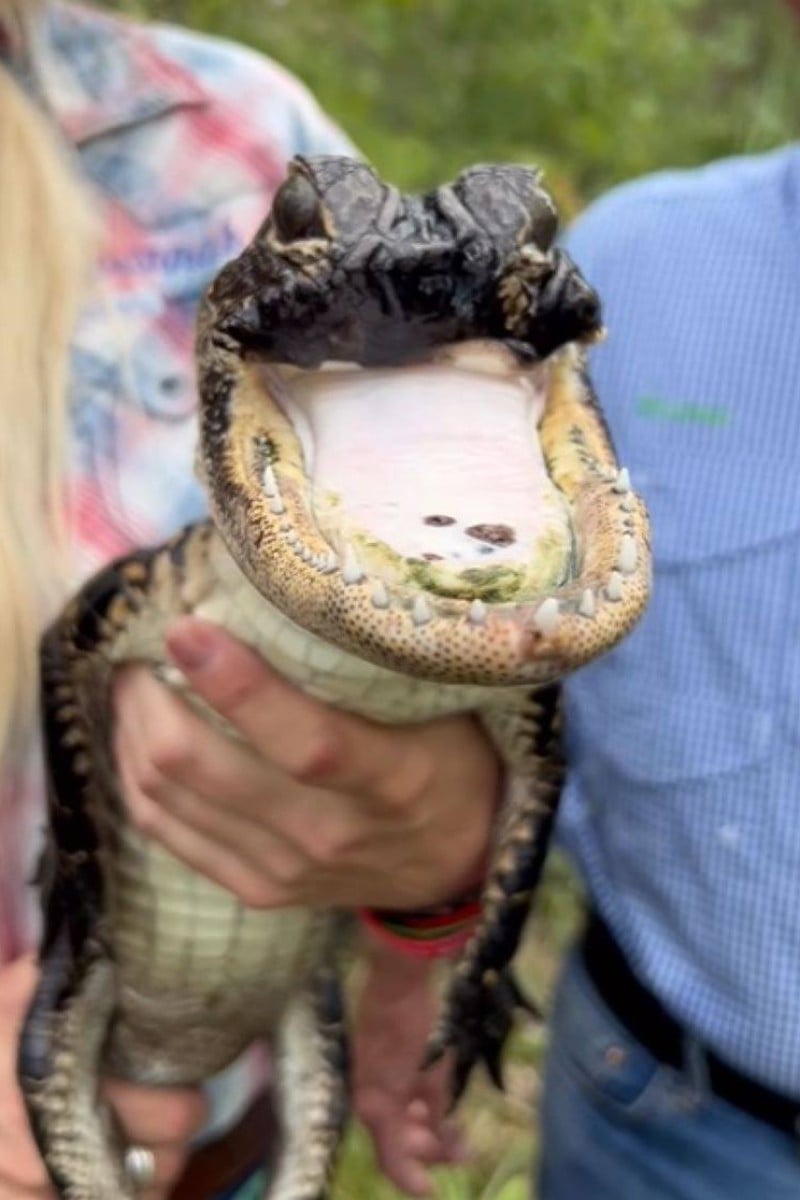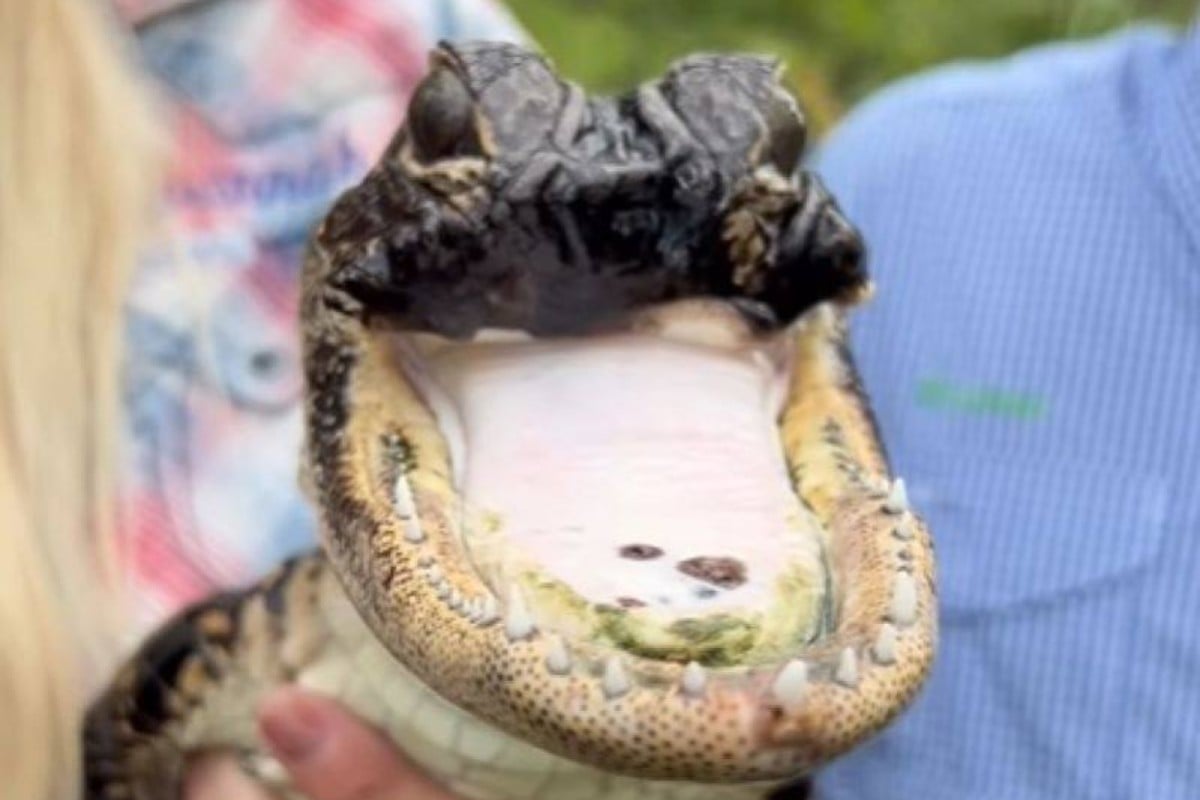
- Now living in a nature park, the little gator is missing her upper jaw after an accident, but her carekeepers are impressed by her drive and ability to survive
- Practise your English with our short listening exercises: play the audio linked below; answer the questions; and check the answers at the bottom of the page
 Jawlene may be missing her upper jaw, but she doesn’t let it stop her from thriving. Photo: Instagram
Jawlene may be missing her upper jaw, but she doesn’t let it stop her from thriving. Photo: InstagramQuestions
1. What is the name of the nature park where Jawlene is staying?
A. Gatorland
B. Orlando Park
C. Nature Haven
D. Alligator Sanctuary
2. Complete the following sentence using information from the podcast.
Jawlene is in good condition in general. However, because of her (i) _____ size and the fact that she lost her (ii) _____ jaw, caretakers are working to make sure she is (iii) _____ before she is available for (iv) _____ by the general public.
3. According to the podcast, how might Jawlene have been injured before being rescued?
A. by a sharp knife
B. by a boat propeller
C. by a snake
D. information not given
4. What was Jawlene’s condition when she arrived at the park?
A. She was missing a leg.
B. She was healthy and strong.
C. She was severely underweight
D. She was unconscious.
5. What does the word “sinuses” in the podcast refer to?
A. part of an alligator’s nervous system
B. part of an alligator’s digestive system
C. part of an alligator’s respiratory system
D. information not given
6. What food does Jawlene not like?
(1) shrimp
(2) beef
(3) rats
A. (1) and (2) only
B. (1) and (3) only
C. (2) and (3) only
D. all of the above
7. According to the podcast, what diet do apex predators like alligators prefer?
A. vegetarian diet
B. whole-prey diet
C. fish and seafood
D. information not given
8. How often is Jawlene currently being fed?
A. once a week
B. less than three times a week
C. as many as five times a week
D. as often as she likes
9. If someone is trying to “bulk” up, they want to …
A. maintain their weight.
B. go on a diet.
C. improve their health.
D. increase in size.
10. Based on the podcast, when do alligators slow down their metabolism?
A. when they are mating
B. when their body temperature is too high
C. when there is not enough food available
D. when they have eaten too much food
11. What common misconception about alligators is mentioned in the podcast?
A. They can live without their upper jaw.
B. They cannot stay in the water for very long.
C. They enjoy eating pork.
D. They need to eat all the time.
12. According to the podcast, how do Savannah and other carers at the nature park most likely feel about Jawlene?
(1) amazed
(2) proud
(3) concerned
(4) indifferent
A. (1), (2) and (3) only
B. (1), (3) and (4) only
C. (1), (2) and (4) only
D. (2), (3) and (4) only
Answers
1. A
2. (i) tiny/small; (ii) top/upper; (iii) healthy/well; (iv) viewing
3. B
4. C
5. C
6. A
7. B
8. B
9. D
10. C
11. D
12. A
Script
Adapted from Tribune News Agency
Adelene Tsui: A little alligator called Jawlene, with no upper jaw, made international headlines recently when she was brought to Gatorland nature park in Orlando, in the US state of Florida. Today, we have Jawlene’s caretaker, Savannah Boan, to tell us more about this miracle alligator. Welcome, Savannah!
Savannah Boan: Hi Adelene! It’s a pleasure to be here.
Adelene Tsui: It’s lovely to have you! So, how is Jawlene and when can we meet her?
Savannah Boan: Jawlene is doing well at the moment. But she’s still quite tiny, and we are concerned about getting her healthy. She is not yet available for viewing by the public.
Adelene Tsui: Right. Do you have any idea how Jawlene lost her upper jaw?
Savannah Boan: The trapper that brought her to us, Jerry, thinks she got hit with a boat propeller or a hunter’s snare because it is a very straight cut, and it was completely healed by the time she came to us. But she was really underweight when we got her.
Adelene Tsui: I hear this isn’t unusual in the wild, that a gator can lose their top jaw and survive.
Savannah Boan: Yes, lots of alligators and crocodiles lose their top jaws in battles. Usually, we see it from bigger alligators and they survive fine. I doubt Jawlene would have survived long, though. She would have continued to go down in weight, and that’s one thing we are working on now – getting her to a healthy weight.
Adelene Tsui: How do you think Jawlene survived long enough to be rescued?
Savannah Boan: Based on how we have seen her eat, we think she hunkered down in the shallows. We put something on her tongue, and she puts her bottom jaw up really high and slides it back. I would imagine that’s how she was eating when she was a wild alligator. Also, because her sinuses were cut off, she can’t really smell.
Adelene Tsui: Oh no! How does she breathe then?
Savannah Boan: She has a hole left open in her sinuses. She taught herself to use her glottis, or her airway, before she got here. She found a way to cover the hole for her sinuses with her glottis so that it doesn’t fill up with water when she goes under. She taught herself that; we didn’t teach her. She’s pretty fascinating.
Adelene Tsui: Oh wow! She is fascinating indeed. You mentioned earlier about getting Jawlene to a healthy weight. Does she have any food preferences?
Savannah Boan: Oh, definitely. We tried beef, but I guess she didn’t like the texture. We tried shrimp, and she did eat one, but I don’t think she was a big fan. But all animals, especially apex predators, like a whole-prey diet. So what we have been doing is feeding her these little rats that come to us pre-frozen. We thaw them, and that’s the best meal she can have. We feed her twice a week right now so she can gain some weight. We put the rat on her tongue, and she slurps it back. I think she likes those best. But then her second favourite is pork.
Adelene Tsui: Aha! Who would have guessed that alligators enjoy eating pork? That said, why do you only feed her twice a week?
Savannah Boan: Alligators in the wild don’t eat that often. But because Jawlene is so underweight, we are trying to bulk her up. A big alligator could eat six or seven times a year and still be fine. Alligators and crocodiles can go a very long time without eating. They control their metabolism. If there is a food shortage, they can slow their metabolism down. If food is plentiful, they are opportunistic. They don’t have to eat as much as people think they do.
Adelene Tsui: Right. Thank you, Savannah, for sharing Jawlene’s latest news with us.
Savannah Boan: You’re welcome. We are really proud of Jawlene. She is such a great survivor story.